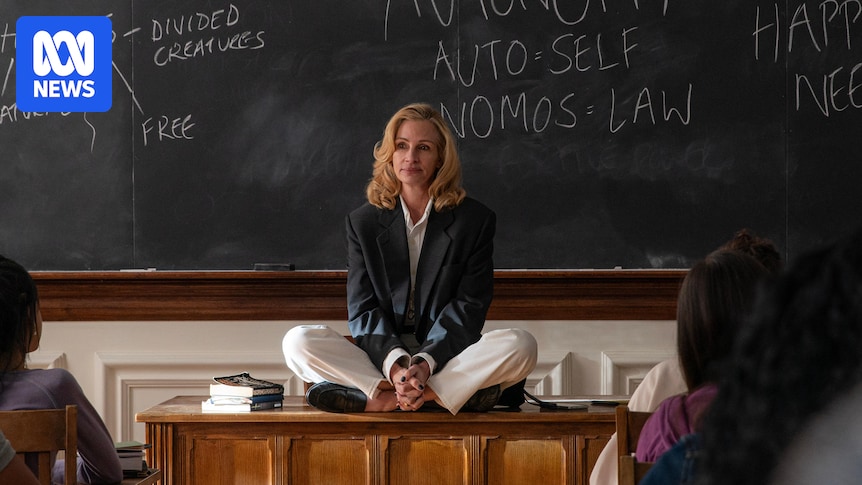Scratch the surface of its half-hearted provocations and you will find an old-Hollywood melodrama impatiently waiting to blossom in After the Hunt. The ingredients are all here — public scandal, duelling divas and unearthed secrets — even if a weak script mired in reheated culture wars can’t support its best ideas.
Fast facts about After The Hunt
What: A psychological drama about a Yale professor caught in the crossfire of a sexual assault allegation
Directed by: Luca Guadagnino
Starring: Julia Roberts, Ayo Edebiri, Andrew Garfield
Likely to make you feel: Queasy
When: In cinemas now
For a filmmaker who has sympathetically untangled all kinds of indecent characters (among them adolescent cannibals and prehistoric witches), Luca Guadagnino can barely temper his contempt for the Ivy League archetypes on display.
Julia Roberts exudes a simmering, stoic allure as Alma, a philosophy professor at Yale — both a conqueror of glass ceilings and a caretaker of the status quo. From a narrative standpoint, her protégé Maggie (Ayo Edebiri) feels carefully designed to rile up an audience: a queer woman of colour whose identity acts as a smokescreen for her privilege and unimpressive intellect.
Maggie’s diametric opposite is Hank (Andrew Garfield in a 180-degree turn from The Social Network), an academia alpha male with whom Alma shares a tight-knit, sexually ambiguous friendship, despite both vying for the same tenured position at their university.
Maggie (Ayo Edebiri) is Alma’s (Julia Roberts) protege in After the Hunt. (Supplied: Sony)
During the film’s opening stretch — an interminably dull party in Alma’s apartment strung together by masturbatory intellectual discussion — Maggie uncovers a hidden envelope harbouring a bombshell revelation, before later being accompanied home by Hank.
The following day she confides in Alma that Hank asked to share a drink at her apartment, then sexually assaulted her. The particulars are left vague, with cinematographer Malik Hassan Sayeed shooting Maggie in fragmented shallow-focus close-ups, shadows etched into her face — though she insists that Hank “crossed a line”.
Rather than offer sympathy or counsel, Alma coldly presses her for details. It’s a disquieting encounter, not just for the devastating allegation at its centre, but in how its discussion of sexual assault quietly becomes consumed by its optics.
Mark missed
The script (penned by first-time screenwriter Nora Garrett), set in 2019, is largely ill-equipped to address an era in which intimate traumas became a collective phenomenon experienced through frenzied media coverage, online discourse and political retributions from which we have all become inexorably more jaded and exhausted.
Comparisons with Tár are inevitable and unflattering. Where Todd Field’s film toyed with audience sympathies, confronting our perverse joy in observing the public humiliation of a corrupt, powerful woman, Guadagnino muddies the water surrounding his imperfect victim, and doubles down on cheap shots at college students in the process.
Alma (Julia Roberts) must decide who to believe after her long-time friend Hank (Andrew Garfield) is accused of sexual assault. (Supplied: Sony Pictures)
For all the furore caused by Eddington’s satirising of 2020’s Black Lives Matter protests, it portrayed its white teens as fundamentally sincere and well-intentioned, if sheltered and helplessly online. The woke kids of After the Hunt are almost uniformly cynical and image-obsessed, including Maddie’s non-binary law student partner Alex (Lio Mehiel), who enthusiastically adopts the role of her legal adviser.
Throwing further fuel onto the fire is Hank’s own recrimination: that, prior to her accusation, he confronted her about plagiarising her dissertation on (of course) virtue ethics, lending potential credibility to his inflammatory assertion that Maggie is “exploiting a shallow cultural moment”.
The film’s tiresome conversations about ethics, theory and cancel culture gradually dissolve into background noise, from which Trent Reznor and Atticus Ross’s piercing, sparsely orchestrated score offers a nerve-tingling counterpoint.
This is partially by design; you get the sense that Guadagnino is vastly more interested in probing the contradictions of Alma’s embattled character than in staging a button-pushing MeToo morality play.
Alma’s relationship with Maggie becomes strained after she comes forward with sexual assault allegations. (Supplied: Sony)
Even then, the film’s coyly withheld revelations strands an otherwise compelling Roberts within a hollowed-out mystery of a protagonist.
Glimpse of gold
Still, there’s a pleasure in watching a movie star like Roberts finally sink her teeth into a mid-career role that isn’t Oscar bait or streaming trash.
Teen cannibal movie starring Timothée Chalamet pairs a grisly subject with romance
Alma’s disdain for the airing of dirty laundry is complemented by her own intensely compartmentalised pain. On top of a long-suppressed psychological trauma that roils to the surface, she’s plagued by stomach pains and bouts of vomiting, which she addresses with illegal prescription painkillers and a pursed smile, careful to keep her crisp white outfits clean.
Guadagnino does his best to burnish the limp screenplay. Tactile shots of hands — beckoning, massaging, grasping — communicate much of the film’s emotional tapestry. Intense dialogue scenes volley between quivering POV close-ups, trapping the viewer into the interstices of shared personal space.
The film also isn’t without its genuine bursts of wit, particularly in its supporting cast of Guadagnino regulars; Michael Stuhlbarg is wonderfully catty as Henrik, Alma’s passive-aggressive (though endlessly supportive) psychiatrist husband, while Chloë Sevigny plays a student counsellor who bemoans Gen-Z’s lack of psychological hang-ups.
As a (not-so-distant) period drama, it would be beside the point to criticise After the Hunt for being dated.
By focusing on the particulars of campus politics under the first Trump administration, it underlines the stark differences with America’s current political climate, in which college campuses have become rocked by free speech crackdowns and assassination; a coda set in late 2024 wryly spells out this comparison with a series of recent news headlines.
But at its worst After the Hunt can feel as insular as the world it’s condemning.
Loading Instagram content
After The Hunt is in theatres now.

